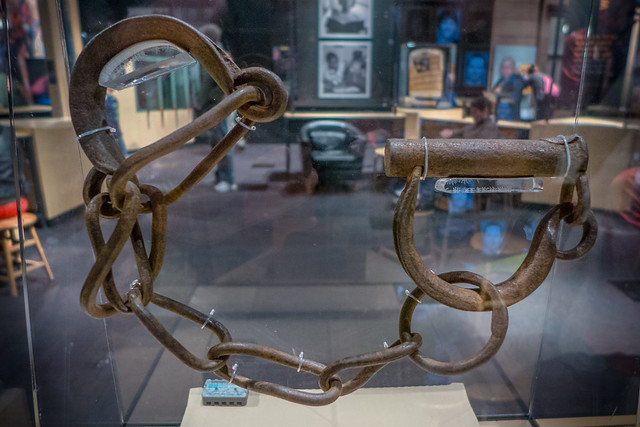“Relax,” said the night man, “We are programmed to receive. You can check-out any time you like, but you can never leave!”
—The Eagles, Hotel California

The world beyond the gate. Can you make that first step and keep going? [Flickr page] I spent the first forty-odd years of my life in a fundamentalist
Christian sect that considers itself “God’s Kingdom,” the exclusive
repository of grace on this earth after 2,000 years of
Christianity. Leaving it was one of the best and hardest things I’ve ever done.
Conservative Laestadianism attracts few converts and retains fewer
still of those, with the notable exception of some vibrant missionary
activity in Africa. In Finland–where most of its 100,000 or so
adherents reside–and in North America, almost all new members arrive
at the maternity ward. There are plenty of them, since birth control
is frowned upon.
The church safeguards the souls of its new arrivals by instilling into
their small brains its doctrines and all the nuances of a uniquely
closed and controlling subculture. Its own survival is at stake. These
are the innocent little lumps of fresh clay that this religion, like
so many others, molds and shapes into the soft living stones of its
shaky spiritual house.
A substantial portion of them last through early adulthood, until
young marriages can start producing their own fresh batches of new
members. The cycle continues anew, as it must. These blocks of flesh
and blood wear out, sometimes even slip away, and must be replaced if
the structure is to stand.
———
Until recently, it was very rare for anyone beyond their twenties to
walk away from this “living faith.” The few cases I’d heard about were
older singles who despaired of having their nets come up empty in a
stagnant little pond of church-approved prospects, and a few spouses
who had been faced with or created problems in their marriages. Then a
friend of mine left the church, staying happily married and with kids,
for reasons that focused on the church itself. That sort of thing just
did not happen once you reached a certain age.
Then it happened to me, too, and my wife. And now it has been
happening to quite a number of people, both in Finland and North
America. Even more than the open defections, there seems to be a lot
of private grumbling, questions no longer so easily tamped
down. Pressure slowly and silently builds inside the minds of troubled
believers–sermon after sermon, baby after baby–and the familiar
preaching of forgiveness for “sins and doubts” no longer seems to
provide much relief.
But the believing brain can withstand a lot of pressure. Those who
make it through all those years of indoctrination and cozy
familiarity–of family, friends, and social setting–have strong
containers in their heads to keep it all bottled up. Sundays pass,
more children are born and taught sound doctrine, and for every person
who manages to leave, there are probably a dozen who want to but do not.
A Finnish correspondent who did manage to leave describes a web of
stuff that he had to cut through before he could finally set himself
free. The first strand of it is social dependence.
“My whole life I have been ‘rooted into God’s Kingdom,’” he says. That
made him “almost completely dependent on this religious community.” He
was taught that most of his “friends should be ‘other believers,’
meaning other Laestadians,” and spent his childhood being brought to
services, church camps, Sunday schools, Bible classes, and church
youth activities. Molding and shaping the clay.
There was plenty of time for it. He was kept from the “‘worldly’
leisure activities that non-Laestadian kids attend.” No team sports at
school, no dances, no TV or movies.
Next is moral dependence. There was little emphasis on any
individual conscience. Rather, he was taught about a “community
conscience: An individual may be erring but ‘God’s congregation’
cannot.” From childhood, he had been told
that ministers and Laestadian publications are God’s Word. When they
say that God is Almighty, and that he doesn’t want us to use birth
control, that he tortures the disobedient people infinitely, then I
have no other option but to believe. I have also been warned that I
can’t make decisions based on my own opinions and thoughts, because I
should ask the congregation for advice.
He was also made spiritually dependent on Laestadianism. His “own
will and conscience” was “crushed and replaced with a gospel”–a
formulaic preaching of absolution central to Laestadian doctrine and
practice–“that only this community can provide.” Laestadians preach
“the gospel” often, regular believers in private conversation and
ministers from the pulpit: Your sins are all forgiven in Jesus’ name
and blood. My correspondent was
taught by these minister-gods that I get my sins forgiven by the
absolution gospel. If I don’t go to Laestadian services, I won’t hear
this sermon and the gospel, and therefore I remain a prisoner in
sin. And if I remain a prisoner in sin and die in such condition, I
will be condemned to eternal perdition and torture.

“Wouldn’t a smart individual, living in modern Finland, be able to
question these doctrines?” he asks. “Of course, but everything is not
always as simple or easy as it may seem.” Indeed not. My own process
of questioning and eventually rejecting that same inherited faith
compelled me to do a year of full-time research and writing, spending
“thousands of hours researching seemingly every aspect of Conservative
Laestadian history, doctrine, and practice, plus Christianity in
general, plus the Bible and the very nature of God,” as I put it in
the resulting 700-page book, An Examination of the Pearl. It was “a
labor driven by love, but also by the mental anguish of being unable
to avoid questioning a doctrinal system that demands firm confession
of belief, on pain of eternal damnation.”
Leaving the faith I had inherited and cherished for 40 years was not
an easy thing for me to do. Nor was it for my Finnish
correspondent. He “had been made dependent on the community in every
possible way.” And when he “started to question a small portion of
this doctrine,” he “was immediately faced with the alarm mechanisms in
the community.” Structural damage, one of the building blocks is
slipping out of place!
He got rebuked and heard about people’s worries that he was on the
wrong path. “The community that now pressured me threatened to take
away all the good that the community was giving me, if I continued
to question these matters” (my emphasis). Because of this threat, he
says, “most Laestadians don’t let these questions arise even in their
own minds: They stifle these thought processes immediately, and ask
for their sins and doubts forgiven like they have been taught to do at
services.”
Now he happily reports that he’s been able to build a social life
outside the church. The old “Laestadian-based network was getting
thinner,” anyhow, because of his questioning things. And he’s noticed
that he just doesn’t “need the spiritual nourishment in this
community” anymore: “I was able to break free from this dependence and
obey my own conscience.”
The church social network doesn’t readily extend far outside its
narrow confines, and that’s certainly true among Conservative
Laestadians in North America, too. One man who left the LLC
(Laestadian Lutheran Church) has managed to stay somewhat attached,
though only after dealing with a huge outcry from church friends and
family. It was, he says, “one of the most painful experiences I ever
went through.” But the “constant badgering only reinforced the thought
that I made the right decision.”
After a few months of heated arguments and accusations about not
loving family, of hearing about people’s prayers “for me to have
restless days and sleepless nights so I would see the condition of my
heart,” it finally started to get better. “People must have finally
realized that I no longer wanted to remain inside the LLC box.”
The same thing happened to a correspondent from another branch of
Laestadianism, the Old Apostolic Lutheran Church. She got “calls,
texts, voicemails, old-fashioned letters, and even emails.” (The
Internet is mostly a no-no in the OALC.) “A majority of what I
received was genuine concern–for my soul, my life, my eternity.”
There was some coercion and manipulation there, too, she says, but
believes that was done out of concern. “Though it hurt me then, I
understood where they were coming from, and still feel the same
today. They know only what they know. I think Maya Angelou said, ‘We
did then what we knew then, we do now what we know now,’ or something
along those lines. That is all that they know, and I pity them for it.”
There are a lot of religious groups filled with people who “do only
what they know” and make life difficult for their friends and family
who have learned a bit more. I’d like to give some perspective and
encouragement to people facing a difficult path out of their inherited
religions–Laestadian and otherwise–by discussing two extreme
examples.
The Exclusive Brethren
The first of these is a Protestant Christian sect that holds what
Wikipedia
calls “an uncompromising ‘separatist’ doctrine.” David Tchappat’s
fascinating book Breakout (official excerpt available
here)
describes the difficult departure he made from their
midst. This
fascinating half-hour audio interview with the author is highly
recommended, especially for troubled Laestadians; you will hear a lot
of things that sound weirdly familiar.
Social dependence was certainly a factor for Tchappat. Being “born
into the Exclusive Brethren,” he says, “ensured that your small
following of fellow churchgoers was your society whether you liked it
or not. Having a social circle outside of this was not an
option.”
Journalist Michael Bachelard estimates the number of worldwide members
at 43,000, Australia being home to about a third of them.
Tchappat provides the same estimate, adding, “Almost all growth comes
from births, as conversions into the faith are practically unheard
of.” It is indeed a “small following,” as Tchappat puts it, at
least when compared to most Christian denominations. But that’s a
matter of perspective; the closed church society in which I grew up
has about half as many members in my country as Tchappat had in his.
The Australian TV program A Current Affair recently aired a
scathing documentary, twelve minutes of which you can watch online,
about what it bluntly calls a “secret cult.” Bachelard describes the
Brethren as having erected “a wall between themselves and the outside
world.” Since 1960, he says, there has been a rule against “eating,
drinking, or socializing with any outsider.” What that means, he says,
is “there are no friendships, no social intercourse whatsoever with
outsiders, and sect members are encouraged to behave with an air of
being impervious to the outside world and aloof from it.”

Tchappat refers to his life in the group as a “fishbowl existence.” He
fantasized numerous times about leaving it before finally doing
so. But that was a daunting prospect: “I knew no one in the outside
world and had no idea how to look after myself. Since birth, every
decision had been made for me. My life was regulated by rules and laws
set in place by the Man of God, which were in turn implemented and
policed by the local priests.”
Some of the prohibitions he lists are the same as those from my own
upbringing: marrying outsiders, physical contact before marriage,
contraception, TV, hair coloring, make-up, gambling, and attending
“anything that could be deemed as fun or entertainment.” As I did in
my childhood Laestadianism, it seems Tchappat felt an urge to confess
any infractions of all those rules: “After church when the rest of my
family had gone to bed, and my dad was tidying the kitchen, I
approached him and told him I had to speak with him. He shut the
kitchen door and I immediately broke down, pulling out my list of sins
and confessing them to him.” And this part sounds uncomfortably
familiar, too: “We were told that we were the chosen people and should
feel privileged to be born into this group.”
“It was only the courageous and inquisitive minority that ever dared
to leave the Assembly of God,” says Tchappat. That is also true in the Kingdom of God, my old group’s informal self-designation, though the
number of defectors is growing surprisingly fast. In my own case, the
fear was more of eternal rather than earthly consequences. After many
dark and bloody centuries under the Church, secular governments are
finally forcing Christianity to leave its exit doors unlocked. But
most of them still have the awful eternal threat written in fiery
letters overhead. Abandon all hope, they read, in a twist from the
words inscribed on Dante’s gates of Hell, you who leave from
here.
According to Tchappat’s account, the Brethren are no exception. More
than a year after leaving, he “would wake up in the dead of night
dripping with sweat and would dream of the burning pits of hell.”
Going back, he thought, “was the only way to avoid eternal
punishment.” Though “the Brethren do not officially believe that
they are the only Godly people,” in modern times, anyhow, Bachelard
says they do “believe that those who leave the sect will not be
saved.”
While still in the group, Tchappat had worried about being
excommunicated for having sex with his girlfriend. Those in that
position fared no better in the eternity department. They were, he
says, “described as being worse than people of the world because they
had known the light and turned their back on it. It was considered an
eternal damnation to die out of fellowship and only the grace of God
and forgiveness of the Brethren would redeem such people from the pits
of hell.” Here is his harrowing description of “massive guilt
attacks” he suffered several years after walking away from the group:
I would lie in bed on my days off staring at the ceiling and crying
to myself. I was falling apart. I had my [friends] but I could not
confide in them about my inner personal turmoil. All my teachings
from childhood were coming back to me. I was petrified that I was
going to the gates of hell if I did not fall down and repent. I began
to read my Bible constantly and could not sleep for fear of dying and
entering eternal damnation. I was seriously entertaining the thought
of returning to the Brethren. I did not know how I was going to cope
with such a life change but I did not care. It was a way of escaping
my problems.
That is some heavy shit. Eternity has a way of messing with people’s
heads. But he also describes dire consequences right here on earth, in
this brief life, for those who “enter the world” from the Brethren:
If caught planning an escape, the local priests would place them
under house arrest along with their families and have them put under
assembly discipline, revoking any rights to attend church or
socialise with those in the inner circle of the Brethren. Those over
sixteen years of age who made it to the outside world without
detection, would be ex-communicated and starved of all monetary
assistance and family support, forcing them to return or find
alternative methods of survival.
Bachelard’s book is full of tragic stories about family breakups
occurring because one spouse was excommunicated from or voluntarily
left the group, about parents devoid of contact with their
children. Tchappat’s own story is much the same–a final letter he
sent was “the last form of contact I would ever have again with my
family.” His gripping and sad narrative has an upbeat ending of sorts,
though: “There has never been a time in my life where I have
experienced such inner peace, happiness and satisfaction as the
present day.”
Islam
Leaving the fold is also serious business for the nearly one fourth of
the world’s population who are professing Muslims. In addition to
social coercion and the prospect of their own version of Hell, there
is often a serious threat of physical harm.
Just look at this comment thread
on a web forum calling itself “the online Muslim community” to see how
real that danger is. Some guy with over 2,000 comments posted at that
site states that death is preferable over continued life to people who
claim to be of Islam, leave it, and then call others away from
it. Presumably, the actual preferences of the apostates themselves are
of little consequence. “It’s a mercy,” he says, “for if they
continued, their place in hell would be lower, and lower, and
lower. We judge law by the belief of an afterlife 100% without a
shadow of a doubt. Thus, death is not a ‘bad’ thing if it is done to
prevent chaos.”
Another commentator (4,000 posts) clarifies, “The death penalty for
apostates is for those apostates that leave Islam then work against
Islam in some way.” It’s the same as treason, after all, and the
“penalty for traitors throughout history has been death.” Still
another commentator (not quite 500 posts) adds, “The apostate should
not be put to death until he has been asked to repent three times,”
generously allowing him three days to think things over first.
What a disgusting little attempt to defend medieval intolerance and
barbarity. And there it is, polished with a veneer of twisted logic,
showing up on an Internet discussion forum built by the technology of
a more enlightened age. Seeing that sort of thing helps us outsiders
appreciate why an American ex-Muslim highly regarded on reddit was
moved to post a “Public Service Announcement” on Reddit warning about
coming out. If you are considering telling “your friends and family
that you are not a Muslim anymore,” he says, you should only do it if:
- You are 18+ years of age
- You are old enough to live on your own
- You are financially independent from your family
- You know where to go if you get kicked out
- You do not live in a religiously conservative country like Pakistan,
Saudi Arabia, Iran, etc.
If even one of these conditions is not met, he adds with sober
emphasis,
do not tell anyone you are not a muslim anymore. Seriously. I
understand how hard it is to live a lie and to put up with bullshit,
but in the end, you are going to have a bad time. This can’t be
stressed enough. I can’t tell you how many times I’ve read self-posts
by young, financially dependent ex-Muslims in Muslim countries that
want to do this or have done this and felt deeply worried for
them. It’s not a rational decision to make, and it’s not gonna do
anyone any good if you end up hurt or even killed over it. Don’t put
yourself in danger like that. Believe me, it’s not worth it at
all. Please be considerate of your safety and well-being, and don’t
be a hero unless you’re fully capable of facing the consequences.
Those consequences are very real for one high school student in Saudi
Arabia. I hope he’s been careful about keeping his identity and IP
address well concealed when posting to public discussion forums
online. Out of an abundance of caution, I will just paraphrase his
comment without a link. He hates living in the closet, he says, but
coming out to his parents means that he’ll be shipped off to Mecca to
study Islam for the rest of his life or get beheaded. And his parents
will grieve about his apostasy. Only if he can become financially
independent and move to a country that respects religious freedom will
he even consider it.
Reading this stuff does have a way of putting things into
perspective. Your family has sent you emails and texts expressing
sadness for your soul and offering some self-righteous prayers? You’ve
lost most of your oldest and dearest friends? You miss having a place
to go see familiar faces every week? Yes, that sucks. But at least you
don’t need to worry about being sent to a religious re-education camp
or having your head chopped off. Count your blessings.

Heina Dadabhoy
Islamic states are not good places to be when you don’t
enthusiastically share the state religion. (Or when you are in the
female half of the population, or when you have been accused of a
crime, or when you would just like to have a little enjoyment in life,
but that’s another blog posting.) These anonymous comments from
fearful closeted nonbelievers often express a longing, sometimes even
hope, to live in secular countries.
As an American citizen, Heina Dadabhoy had that good fortune, at
least, when she told her family she was leaving Islam. They thought
she was “turning [her] back on them,” she said in an interview with
the New York Times, her parents accusing “her of thinking that she
was better than her grandparents and other ancestors.” They “reacted
the way they knew how, which was to freak out.” Public defections from
the faith are still very rare, and her parents “had never heard of
anybody leaving Islam. We were raised with the idea you can’t leave,
that nobody can leave. Leaving Islam was something somebody incredibly
deranged would do.”
At a conference a few years ago, I asked Dadabhoy if the fear of Hell
is also a factor for those considering leaving Islam. It definitely
is, she said. Indeed, you can see the eternal fate of the ex-Muslim
spelled out in the Quran itself:
Whoso desireth any other religion than Islam, that religion shall
never be accepted from him, and in the next world he shall be among
the lost. How shall God guide a people who, after they had believed
and bore witness that the Apostle was true, and after that clear
proofs of his mission had reached them, disbelieved? ... Their
recompense, that the curse of God, and of angels, and of all men, is
on them! Under it shall they abide forever; their torment shall not
be assuaged!
Moving On
There are countless other examples of the difficulties people
experience trying to get out of the religions that were foisted on
them at birth. The stories I’ve read in books and on Internet
discussion forums are so numerous and compelling that this essay would
turn into a book of my own if I were to venture too deeply into any of them.
Indeed, even thinking about that makes me recall a whole genre of
books about Leaving the Fold. That, for example, is the exact title
of both Edward Babinski’s fine collection of stories about people
deconverting and Dr. Marlene Winell’s thoughtful guide to doing so.
People are leaving these high-control religious
organizations–slowly and at great cost, and often thinking they are
the only ones going through such a difficult process. Many more stay
behind, wishing they too were in the right circumstance to leave,
biding their time until they can. Here is a brief listing of a few
groups I’ve read about, with quotes from former members who have
walked away and told their stories. I recommend every one of their
gripping, illuminating books.
-
Scientology: “All of a sudden, I felt as if a weight had been
lifted from my shoulders. These were things I didn’t have to worry
about ... a radical thought formed in my head. Because I am not a
Scientologist. It felt good to think it, to say it, to scream
it. I am not a Scientologist.... If something is wrong, I can say
so, honestly and openly, without fear.” –Jefferson Hawkins,
Counterfeit Dreams (2012).
-
Non-Denominational Christianity: “When you’re five and
contemplating Hell, concepts like ‘proportionality’ exist far out of
reach, well beyond climbing range, unknowable. No young child can
digest or discern whether such overt sadism is an appropriate
punishment for the heinous act of simply being born as a descendent
of Adam.” –Seth Andrews,
Deconverted (2012).
-
Fundamentalist Baptist Christianity: “I had developed some kind
of gag reflex for my brain. I just couldn’t think clearly or
objectively about my childhood or my surroundings. I felt like if I
acknowledged things done to me in my childhood that were negative, I
would be guilty of breaking a great commandment. I would be
dishonoring my parents or somehow loving them less. Love entailed a
lot of denial.” –Timothy Michael Short,
Preacher Boy (2011).
-
The People’s Temple (Jim Jones, thankfully defunct): “When our
own thoughts are forbidden, when our questions are not allowed and
our doubts are punished, when contacts and friendships outside of
the organization are censored, we are being abused for an end that
never justifies its means. When our heart aches knowing we have made
friendships and secret attachments that will be forever forbidden if
we leave, we are in danger. When we consider staying in a group
because we cannot bear the loss, disappointment, and sorrow our
leaving will cause for ourselves and those we have come to love, we
are in a cult.” –Deborah Layton,
Seductive Poison (2010).
-
Evangelical Christianity: “Imagine what it would cost you to
give up your faith tomorrow morning; if it is unbearable even to
think of it, then you ought to consider how much the cost of leaving
your faith is influencing your ability to judge your faith
critically and objectively.” –Kenneth W. Daniels,
Why I Believed (2010).
-
The Churches of Christ: “I was deprived of showing spiritual
compassion to others because I was taught that if they were not in
the CoC they were not ‘real’ Christians, and the CoC didn’t seem to
have a lot of concern about people who weren’t real Christians in
their eyes. I was deprived of the fellowship of my classmates on
their religious turf.” –Charles Simpson,
Inside the Churches of Christ
(2009).
-
Mormonism: “I had been taught early on that the only reliable
evidence about the Church–in fact the only evidence at all worth
looking at–comes from the Church itself. This evidence can be
undeniably confirmed, not through logical, deductive reasoning, but
by the emotional feelings we were taught from early childhood to
recognize as being from the Holy Ghost.” –Jack B. Worthy,
The Mormon Cult (2008).
-
The Jehovah’s witnesses: “[T]he only way out of this dilemma was
to acknowledge my feelings and doubts about the organization that I
had suppressed for so long, and what it meant that I was having
them. But doing so was extremely frightening to me, because trying
to face up to my doubts nine years ago only resulted in panic
attacks and anguish, which ultimately drove me back into the
organization. This time, though, I knew I would have to see it
through, as my body would not cooperate with the charade any
longer.” –Diane
Wilson. Awakening of a Jehovah’s Witness
(2002).
There is a lot to learn and think about for people who are considering
the exhilarating but terrifying possibility of leaving their childhood
faith. Are you one of those people? If so, let me offer you my
respect and encouragement, whatever you ultimately decide. Even
without taking another step, you have allowed yourself the delicious
freedom of thinking for yourself, in the privacy of your own brain.
Take your time. The church is right to say that this is the most
important matter of your life, even if its own web of
dependencies–social, moral, spiritual–is what made things that
way. Don’t beat up on yourself for acknowledging how strong that web
is. Cut through each strand at your own pace, however slow that is, or
not at all.
———
And in the process, if there is still a God in your heart that is the
object of your private devotion, give him a little more credit than
your hellfire preachers ever will. Would you ever torture anyone,
for five minutes, even for some terrible crime? You’re better than
that, aren’t you?
How about a child who wandered into your office where she didn’t
belong and messed up your papers, and, after being scolded, angrily
told you she didn’t love you anymore? Would you throw her little body
into a pit of flames and watch the smoke of her torment swirl and rise
as you listen to her scream? For five minutes?
“What kind of a monster do you think I am?” you say. The thought
upsets you, and it should. Think about how slanderous it is against
anything remotely resembling a loving God. Or an omnipotent one: A God
that could stop such horrors but stands aside, unmoved and doing
nothing, is no better than whatever diabolical force you might imagine
feeding the fire.
How about five hours? Five days? Let her scream and burn for five long
days. Disgusting, isn’t it? How about forever? Unrelenting agony,
pain without end, utterly pointless suffering with no hope of
relief. And for what? For not knowing better, just like everybody
outside the particular group you are thinking about leaving? There is
simply no way that anyone–person or God–with the slightest shred of
decency could do such a thing.
Whatever else you do, take that awful and impossible idea off of your
shoulders and quietly put it down. It is not worthy of another
moment’s belief.
Step up from your computer, put down your smartphone. Look at your
innocent child, look outside. See the blue sky and the green trees and
all the good things that you have joyously attributed to your
God. Leaving a controlling religious group does not make all of that
disappear. There is still wonder, there is beauty, there is joy. And
there is a whole lot less guilt and fear.
———
Thanks to Heina Dadabhoy for her photo and the suggestion to “go with the more modern transliteration of ‘Quran’ rather than ‘Koran.’” Also thanks to my anonymous correspondents. Several opined that there have indeed been more departures of late from the SRK, which added to my own impressions about the recent state of affairs in the LLC. I am grateful to the one in Finland who provided an insightful analysis of the various dependencies established by religious groups, and to his able translator. The two in the U.S. have never heard of each other, and come from different groups that call each other heresies, yet they expressed so well the same difficult experience of leaving.
A note of continued appreciation, too, to my dear friend and mentor Robert M. Price, who helped me stay, and then, when I was ready, helped me leave.
I neither have nor claim any inside knowledge about any of the religious groups discussed here except my own former faith, Conservative Laestadianism, and, to some extent, its rival branches. Everything written in this essay about other groups is quoted directly from various published works or publicly available materials. Those who are seriously interested in particular groups should consult the footnotes, read the sources cited as well as the many others available, and form their own opinions accordingly. Those intrigued by Laestadianism may wish to consult the hefty volume I spent a year researching and writing,
An Examination of the Pearl, and its 180 or so references.
Click on (most) individual images to enlarge, or check out their photo pages in my
Flickr photostream. All except for the cover of David Tchappat’s book and Ms. Dadabhoy’s portrait are Copyright © 2014 Edwin A. Suominen. You may freely use them for non-commercial purposes, with attribution, under the
Creative Commons Attribution-NonCommercial 3.0 Unported License.
Notes








